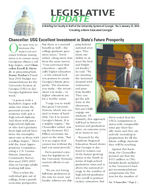LEGISLATIVE UPDATE
A Briefing for Faculty & Staff of the University System of Georgia No. 3, January 25, 2010
"Creating a More Educated Georgia"
Chancellor: USG Excellent Investment in State's Future Prosperity
One sure way to increase the state's tax revenues without raising taxes is to ensure more Georgians obtain a college degree, said Chancellor Erroll B. Davis Jr. in presenting Gov. Sonny Perdue's Fiscal Year 2011 budget recommendations for the University System of Georgia (USG) to key Georgia legislators last week.
"A person with a bachelor's degree will make two times the personal income of someone with just a high-school diploma. And those with just a high-school diploma or who don't graduate from high school have twice the unemployment rate as those with a college degree," Davis told the Joint Appropriations Committee, citing a U.S. Census Bureau American Community Survey that used 2005-2007 data on Georgia adults working full time.
"This is what the individual gets out of college, from a purely economic perspective.
But there is a societal benefit as well the college graduate pays more taxes," Davis added, citing more data from the same survey. "I am convinced that education specifically higher education is the critical tool you possess to create Georgia's future prosperity. The decisions you make the investment you make in higher education are for a worthy cause.
"I urge you to wield this great University System, which was created in times of hardship. Use it to secure Georgia's future. It is a mighty engine," the Chancellor added, noting the System's $12 billion economic impact on the state, "but it is an engine that cannot run without the fuel you must provide."
Davis painted a picture for legislators of the University System's current efforts to cut costs.
"We are not hiring full-time professors at the rate we need, and faculty salaries are slip-
ping behind national averages. This hurts our ability to attract the best and brightest faculty," he said. "We are meeting the increased demand with instructors and parttime faculty. They can get the job done in the classroom, but can't fully engage our students. Ultimately, this approach will lead to lower retention and graduation rates, an outcome none of us wants to see."
Research by the Southern Regional Education Board shows that Georgia is destined to remain one of the fastest growing states in the South in terms of high-school graduation rates and is above the national average in the number of high-school graduates who enroll in postsecondary education. But
Davis noted that the USG's competitors in states with comparable rates pay their faculty more and they are actively recruiting in preparation for all the future college students they will be teaching.
Against this backdrop, the Chancellor pointed out that the $113 million in USG formula funds included in the Governor's budget recommendations compensate the System for the number of
See "Chancellor," Page 2 ...
LEGISLATIVE UPDATE -- January 25, 2010, Issue No. 3
Chancellor
Continued from Page 1...
students it was serving two years ago (when 42,000 fewer students were enrolled), due to a lag built into the formula calculation process.
"The formula funds in this recommendation will leave 19,000 students unfunded, assuming no growth in the fall of 2010," Davis told committee members.
In addition to eliminating more than 2,400 positions, instituting six furlough days and making major changes to employees' health insurance coverage, Davis said, "Unfortunately, we are also cutting back on library books and equipment purchases, deferring maintenance and reducing services to students such as tutoring, mentoring and
advising. Individual institutions are also looking at permanent structural changes, and we have instituted a special institutional fee for students."
Exploding student enrollment has led the University System to offer more and more online courses and programs, yet campuses still need to build additional facilities, the Chancellor noted.
The USG's capital budget request totaled $361.7 million, against which projects recommended for funding total $121 million.
"We recognize that these are challenging times, and we will do the best we can to continue to build for the future," he said. Q
The Chancellor also noted that, two years ago, the System began Fiscal Year 2009 with a budget of $2.3 billion, whereas the Governor's USG recommendations for FY 2011 total approximately $2.08 billion. In addition, he pointed out that state funding per full-timeequivalent student has reached its lowest point in the past decade and is destined to drop further in FY 2011.
"How are we supporting our students with less?" Davis asked. "We are supporting them as a result of our operating efficiencies and hard decisions. However, these decisions are all based on one fundamental principle maintaining academic excellence."
Members of the Standing Higher Education Committees
House
Chair: Len Walker, Loganville Vice Chair: Katie Dempsey, Rome Secretary: Amy Carter, Valdosta Stephen Allison, Blairsville Amos Amerson, Dahlonega Kathy Ashe, Atlanta Carol Fullerton, Albany Pat Gardner, Atlanta Michael Harden, Toccoa Mark Hatfield, Waycross Bill Hembree, Winston David Knight, Griffin Ralph Long, Atlanta
Quincy Murphy, Augusta Chuck Sims, Ambrose Calvin Smyre, Columbus
Senate
Chair: Seth Harp, Midland Bill Cowsert, Athens John Douglas, Social Circle Ronnie Chance, Tyrone John Crosby, Tifton Tim Golden, Valdosta Lester Jackson, Savannah Nan Orrock, Atlanta Curt Thompson, Tucker
Members of the Appropriations Subcommittees on Higher Education
House
Chair: Earl Ehrhart, Powder Springs Secretary: Mike Cheokas, Americus Rich Golick, Smyrna Bill Hembree, Winston Sheila Jones, Atlanta Bob Lane, Statesboro Doug McKilip, Athens Ann Purcell, Rincon Bob Smith, Watkinsville
Richard Smith, Columbus John Yates, Griffin
Senate
Chair: Seth Harp, Midland Vice Chair: Cecil Staton, Macon Don Balfour, Snellville Bill Cowsert, Athens Vincent Fort, Atlanta Bill Hamrick, Carrollton John Wiles, Marietta (ex-officio) Q
-- 2 --
